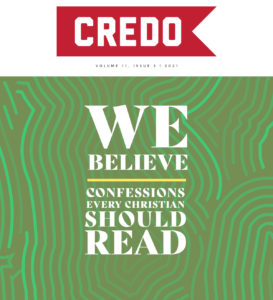Confessions. The word is often met with a blank stare and an awkward silence. Confessions are foreign to many Protestants today, including evangelical Protestants who are sometimes the most unaware of their heritage. That truth stings because Protestantism was built from the start on a confessional identity. Each wing of Protestantism during the sixteenth and seventeenth centuries—from Lutherans to Presbyterians to Baptists—solidified their future with confessional documents that substantiated their adherence to Christianity itself. If our forefathers were resurrected into the twenty-first century, they would cringe to discover Protestants ignorant of their confessional heritage.
I say “cringe” because so many of our sixteenth and seventeenth century forbearers labored to defend their catholicity over against Rome’s accusation of novelty and heresy. To be confessional was not a move made out of convenience but a theological maneuver that grounded the Reformation itself within the stream of the universal church. Confessions of the sixteenth century, for example, were not only hard evidence of fidelity but bulwarks, shields of orthodoxy that protected Protestants when accusations of innovation were lobbed at their trenches like grenades.
Our ignorance is further perpetuated by the evangelical indifference towards confessions. Again, there may be many reasons for this apathy. One of them, however, is startling: evangelical churches, denominations, and institutions are sometimes characterized by a doctrinal minimalism. If in doubt, simply consult “statements of faith” when they address the Trinity. We can lament our present state of Protestant apathy towards orthodoxy but until we return to a confessional tree, we will not enjoy all the fruit it promises. Share on X
The Trinity—a doctrine at the center of Christian orthodoxy—is often treated with unbelievable, even inexcusable brevity in comparison to other beliefs or emphases, a tell-tale sign of where our priorities really lie. When less-than-orthodox approaches to the Trinity seep into our circles—and from within our own ranks—we either are surprised that this could be happening, or we are confused what all the fuss is about to begin with. I am unsure which reaction is worse.
And the Trinity is but one example. Similar scenarios surface with other major components of Christianity, from the attributes of God to union with Christ, from Chalcedonian Christology to justification itself. Never mind how many contemporary statements of faith fixate on when the rapture will occur but say nothing about the beatific vision.
The shallowness of our “statements of faith” is especially exposed when they are brought into the light of historic, Protestant confessions. Setting an evangelical statement of faith next to The Augsburg Confession, The Westminster Confession of Faith, or The Second London Baptist Confession can be embarrassing, like walking into a wedding with nothing on but a Speedo.
However, at the heart of this doctrinal anorexia is something far more foundational, even hermeneutical. A close look at the way we have been taught theology unveils the elevation of the individual. This, too, is ironic since many Protestants pride themselves on their total disgust with postmodernism. In truth, our theological method is not all that dissimilar. Doctrines of the faith—even major doctrines of the faith—are presented to students on a buffet of “views” or “perspectives.” Naturally, the churchgoer and student alike come to the buffet under the impression that they decide what ends up on their plate and what they do not prefer. By the end of the buffet line their plate represents an amalgamation of “views” they have adopted. Each plate is different, its own compilation of favorite dishes.Las Vegas buffet theology is encouraged today. And we wonder why a confession—which represents a whole, healthy system of consistency—does not meet the tastebuds of today’s consumer? Share on X
But the real tragedy is this: Las Vegas buffet theology is encouraged today. And we wonder why a confession—which represents a whole, healthy system of theological consistency—does not meet the tastebuds of today’s consumer? We prefer a less healthy option of our favorite likes rather than the chef’s nutritious synthesis we once called a meal. I am convinced such a theological method can only be the death of theology itself. For everyone did what was right in his own theological eyes.
The antidote is not a mystery. We need confessions. However, a loud holler for confessions will not do until the theological taste buds of our churchgoers and students are changed. Needed then is not an additional confessional dish in the buffet line, but a whole new paradigm to theology.
The good news is this: the new paradigm to theology is quite old. Ancient in fact. It requires a return to a theological mindset that not only refuses to settle for doctrinal minimalism but considers Christianity an organic whole, rather than disparate parts chosen according to each one’s liking. We can lament our present state of Protestant apathy towards orthodoxy but until we return to a confessional tree, we will not enjoy all the fruit it promises.


